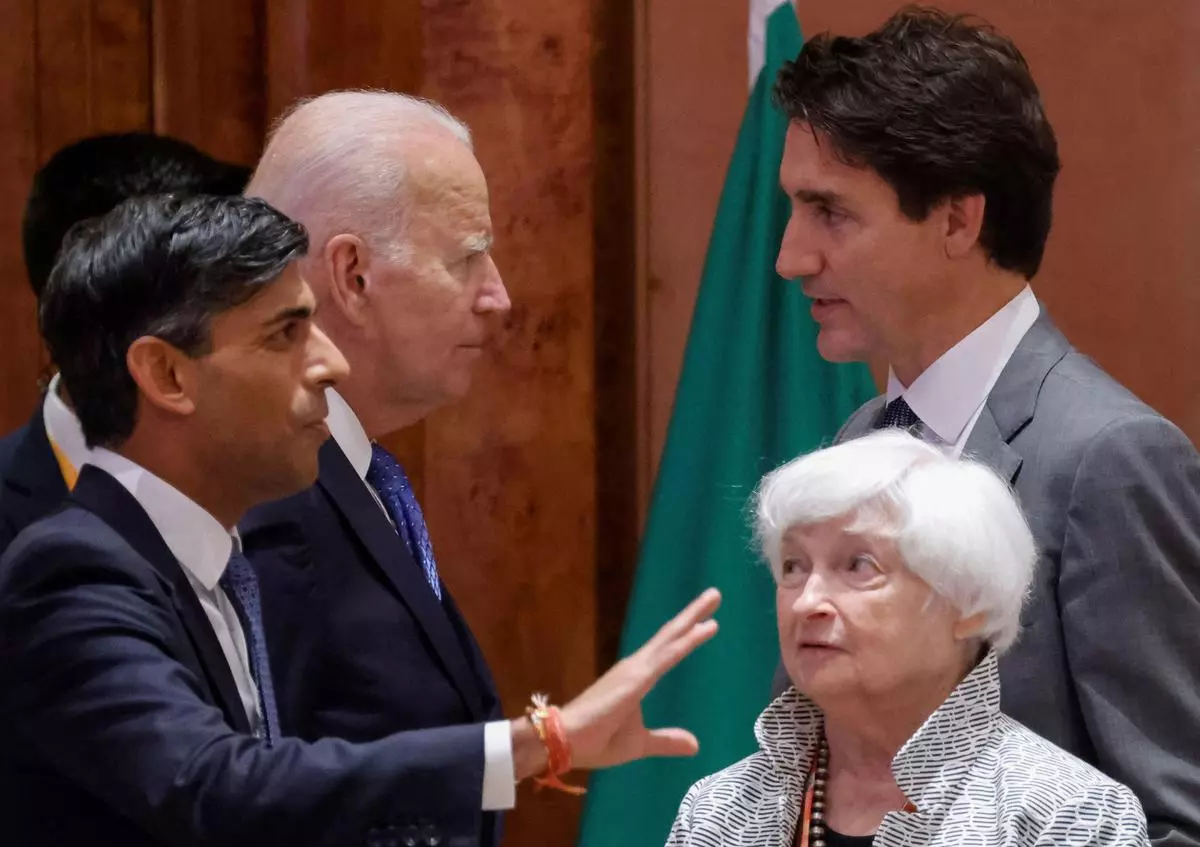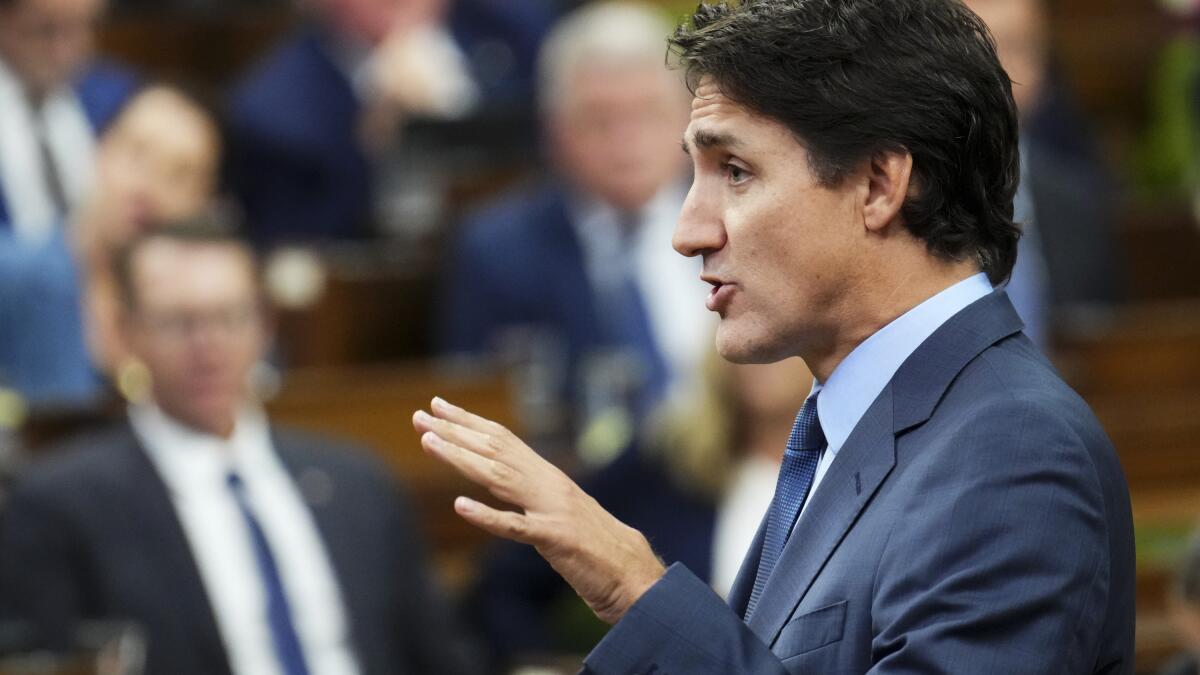G20 Parliamentary Speakers’ Summit: Canada missing from the event; Trudeau-Nijjar fallout the reason?

G20 Parliamentary Speakers’ Summit: Canada missing from the event; Trudeau-Nijjar fallout the reason?
Prime Minister Narendra Modi is scheduled to inaugurate the 9th G20 Parliamentary Speakers’ Summit (P20) in the national capital on October 13th. This summit brings together parliamentary speakers from various G20 member countries to discuss and deliberate on global issues of significance.
It’s noteworthy that Canada appears to be absent from the P20 and Parliamentary Forum program list. The absence of a country from such international forums can have various reasons, including scheduling conflicts, changes in leadership, or policy decisions. However, the specific reasons for Canada’s absence from this particular event would require further information from official sources.
The G20 Parliamentary Speakers’ Summit is an important platform for parliamentary leaders to exchange views and contribute to discussions on global challenges, including economic issues, environmental sustainability, and international cooperation. The absence of a member country can affect the dynamics of these discussions, but the summit will likely proceed with participation from the other G20 member nations.
The absence of Canada from the 9th G20 Parliamentary Speakers’ Summit (P20) and Parliamentary Forum program list may indeed be related to the ongoing tensions between India and Canada. These tensions have been fueled by allegations and accusations stemming from the killing of Khalistan terrorist Hardeep Singh Nijjar.
The situation escalated when Canadian Prime Minister Justin Trudeau suggested the involvement of Indian agents in the Nijjar killing. In response, India asked Canada to withdraw its diplomats, reflecting the seriousness of the diplomatic dispute between the two countries.
Such diplomatic tensions can have a significant impact on various aspects of bilateral relations, including participation in international forums and events like the G20 Parliamentary Speakers’ Summit. The decision to exclude Canada from the P20 summit may be a reflection of these strained relations.
It’s important to note that diplomatic disputes between countries can have far-reaching consequences, affecting not only official diplomatic channels but also various other areas of cooperation and engagement. The absence of Canada from this summit is just one of the manifestations of the broader diplomatic issues at play between India and Canada.
The killing of Hardeep Singh Nijjar, a designated terrorist known for his support for Khalistan, has indeed been a source of contention between India and Canada. India has firmly denied any involvement in the killing, while Canadian Prime Minister Justin Trudeau suggested that Indian agents might have been involved.
Hardeep Singh Nijjar’s background as a Khalistan supporter and his designation as a terrorist in 2020 add complexity to the situation. These factors likely contributed to the tensions surrounding his killing.
Reports indicate that India requested Canada to withdraw 41 diplomats by October 10, suggesting the seriousness of the diplomatic dispute between the two nations. Such actions reflect the diplomatic consequences of the allegations and counter-allegations related to this incident.
The differing narratives and positions of India and Canada highlight the challenges in resolving such disputes and the potential impact they can have on diplomatic relations and participation in international events. The situation underscores the need for careful and thorough investigation and diplomatic dialogue to address the underlying issues and concerns.
The ongoing dispute between India and Canada, which includes India’s demand to reduce the number of Canadian diplomatic staff in the country, appears to be a matter of diplomatic negotiation. India has reportedly requested parity in mutual diplomatic presence, but it’s been reported that Canada has rejected this argument.
Negotiations and discussions between the two nations are likely underway to find a resolution to this issue. Diplomatic negotiations often involve various considerations, including mutual interests and diplomatic protocols.
Despite the diplomatic tensions, the 9th G20 Parliamentary Speakers’ Summit (P20) is set to proceed with the participation of speakers and heads of delegations from various countries, including Indonesia, Mexico, Saudi Arabia, Oman, Spain, the European Parliament, Italy, South Africa, Russia, Turkey, Nigeria, Australia, Brazil, the UAE, Singapore, Japan, Egypt, and Bangladesh. These countries will send their representatives to the event, which is aimed at addressing global issues and fostering international cooperation among G20 member nations.
The 9th G20 Parliamentary Speakers’ Summit (P20) is set to be hosted by the Parliament of India, forming part of India’s overarching role as the current G20 Presidency holder. This summit, guided by the theme “Parliaments for One Earth, One Family, One Future,” underscores the importance of global cooperation and solidarity in addressing pressing challenges.
The event will feature the participation of Speakers of Parliaments from G20 member nations and invitee countries. It serves as a platform for parliamentary leaders to engage in discussions and collaborative efforts on critical global issues.
The 9th P20 Summit will center its discussions on four pivotal subjects:
- Transformation in People’s Lives through Public Digital Platforms: In an era of rapid technological advancement, this topic explores how public digital platforms can positively impact the lives of individuals worldwide. It delves into the potential for technology to enhance access to services, information, and opportunities, ultimately fostering inclusive development.
- Women-led Development: Recognizing the integral role women play in societal progress, this subject highlights the importance of empowering women in all facets of life. It addresses gender equality, women’s leadership, and the advancement of policies and initiatives that promote women-led development.
- Accelerating SDGs (Sustainable Development Goals): The United Nations’ Sustainable Development Goals are a global blueprint for a better and more sustainable future. This topic explores strategies and actions to accelerate progress toward achieving these goals, addressing critical issues such as poverty reduction, healthcare access, and environmental sustainability.
- Sustainable Energy Transition: With growing concerns over climate change and energy sustainability, this subject emphasizes the need for a transition to clean and sustainable energy sources. It discusses policies, innovations, and international cooperation required to achieve a more environmentally responsible energy landscape.

The P20 Summit provides a valuable opportunity for parliamentary leaders to share insights, experiences, and best practices on these pressing topics. It reflects the commitment of G20 member nations and invitees to collaborate on global challenges, fostering a sense of shared responsibility for the well-being of people, the planet, and future generations. The discussions at this summit have the potential to shape policies and actions that address some of the most critical issues facing the world today.




